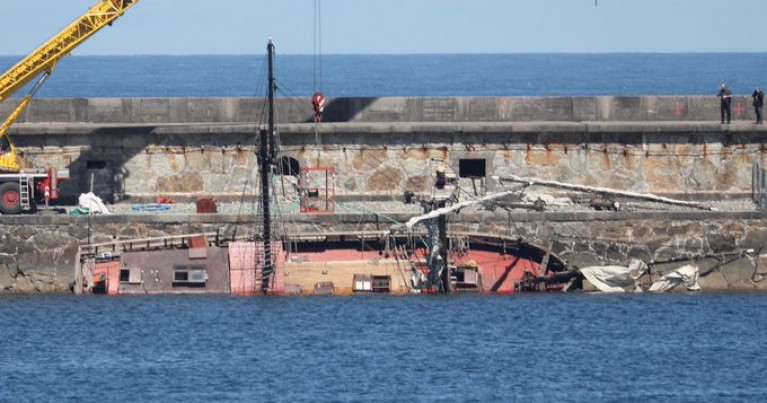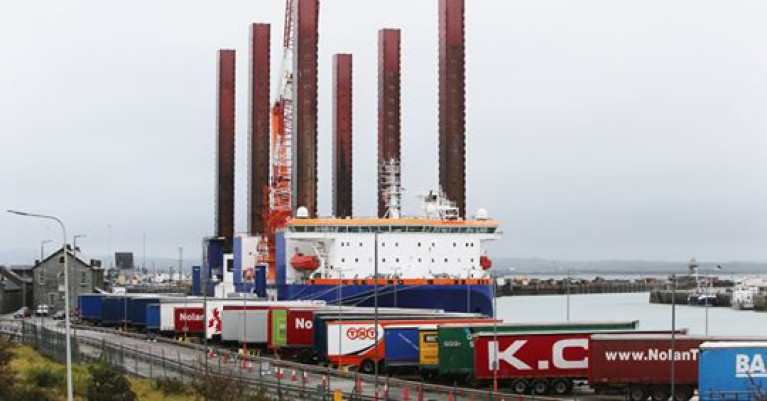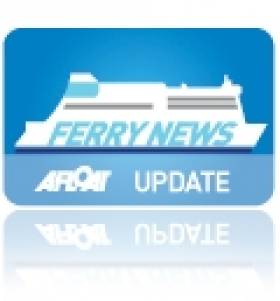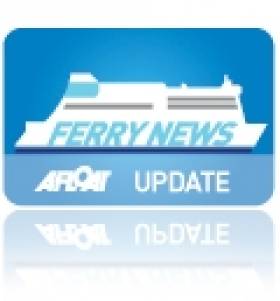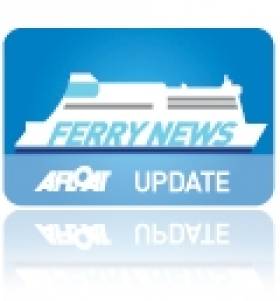Displaying items by tag: Bad Weather
Bad Weather on Firth of Clyde Sees CalMac's MV Hebridean Isles Forced to Relocate to Ayr
On the Firth of Clyde a Caledonian MacBrayne (CalMac) ferry which has been plagued by technical problems for almost six months, has been seen at a berth in Ayr harbour.
The port of Ayr, operated by Associated British Ports is located south of Troon and also Ardrossan from where the ferry route connects Brodick, Isle of Arran.
The 1985 built ferry MV Hebridean Isles, one of oldest in the fleet, made for an unusual sight at Ayr as CalMac was forced to change the usual berthing arrangements for its ageing Arran ferries due to the bad weather.
Hebridean Isles was seen arriving into Ayr on the morning of Tuesday, 1 August in a passage from Troon which Afloat adds took around 40 minutes to complete and the ferry remains in Ayr this morning, 3 August.
The 494 passenger ferry, one of two serving Islay-Kennacraig, Isle of Mull (see above Afloat photo) was deployed to the Arran run but has been unable to operate since February because of 'manoeuvrability issues'. This has forced CalMac to charter the 430 passenger and vehicle catamaran, MV Alfred, from private operator Pentland Ferries serving South Ronaldsay, one of the Orkney Islands.
The 3,040 gross tonnage Hebridean Isles has been berthed in Troon (see Arran 'freight' run) in efforts to continue to try and fix technical problems.
Due to the "lack of space" however, Hebridean Isles was forced to head for Ayr, as the bad weather was forecast on the Clyde which also restricted the use of berthing facilities at Ardrossan harbour.
A spokesperson for CalMac said: "Due to adverse weather forecast on Wednesday, August 2, MV Caledonian Isles will berth overnight on the Irish berth in Ardrossan tonight (Tuesday, August 1)".
"As a result, MV Alfred will relocate to Troon for overnight berthing tonight. Due to lack of space at Troon, and to accommodate the relocation of MV Alfred, MV Hebridean Isles has been requested to temporarily move to Ayr."
More from theAyr Advertiser on the Clyde route and the redeployment of the Isle of Arran, the second routine ferry on the Ardrossan-Brodick route.
In Holyhead, a stricken tall ship which ran aground last week at the north Wales port's breakwater is set to be dismantled.
It is understood that the 83-year-old tall ship Zebu has been too badly damaged to be salvaged.
A crane company is expecting to remove the two masts today with bad weather forecast.
As NorthWalesLive reported on Tuesday, the rest of the dismantling work is expected to be completed next week.
"It's very sad," said Mark Francis, of Bob Francis Crane Hire. "She's a piece of British nautical history.
"There will never be another one like her built again because the skills and crafts needed are being lost."
He added: "We are taking all the rigging and the masts off to stabilise the hull. We may have to stop then until next week because of a freshening blow."
More from the newspaper here.
Offshore Wind Turbine Giant Ship Set to Leave Holyhead But Weather Holds Up Departure
On the Irish Sea a giant wind turbine vessel has had its departure from the Port of Holyhead delayed by the weather.
MPI Resolution arrived at the port on Thursday after sailing in from Rotterdam - with its towering 220ft height attracting attention.
It is operated by Dutch firm Van Oord who told North Wales Live the vessel is set to do operations and maintenance work on Irish Sea wind farms.
Port authority Stena Line said the ship was due to depart on Monday but the poor weather conditions have kept her at port.
They have been notified the captain is now set to sail her out of the Anglesey port on Wednesday.
More Bad Weather and Maintenance Lead to Cancelled Sailings
#CancelledSailings – As yet another gale warning is in effect some ferry sailings have been cancelled today on the Irish Sea and on French services.
Travellers are advised to check for updates on the latest sailing information from Irish Sea operators by clicking these following website links for Irish Ferries, P&O Ferries and Stena Line.
Passengers on Stena Line's Belfast-Cairnryan route take note that due to essential ferry maintenance, the following sailings (to Scotland) at 11.30 and 19.30 for this weekend (15-16 Feb.) have been cancelled.
On the Ireland-France service, Celtic Link Ferries sailing tonight from Cherbourg (21.00) to Rosslare has been cancelled due to adverse weather conditions.
In addition further details are also available by visiting the AA's ferrywatch service.
Bad Weather Continues to Disrupt Christmas Sailings
#CancelledSailings - As storms force winds and gales continue to batter the coast, some ferry sailings have been cancelled on the Irish Sea.
Travellers are advised to check for updates on the latest sailing information from operator websites, in addition to visiting the AA's ferrywatch.
Despite the efforts of ferry operators to increase additional capacity on the central coridoor routes in the run-up to the festive period, adverse weather conditions have won out, particularly on Irish Ferries services on the Dublin Port-Holyhead route.
Stena Line managed to carry out HSS fast-craft crossings earlier today, with a scheduled round-trip completed between Holyhead and Dun Laoghaire Harbour. The return of the HSS today marked the start of the festive season schedule with sailings operating on selected dates this month and early into the New Year.
Bad Weather Leads to Cancelled Ferry Sailings
#CancelledSailings - Due to adverse weather conditions, some ferry sailings across the Irish Sea have been cancelled.
For the most up to date information on sailings times of ferry operators and how to contact them directly, the AA provides an updated live service.


























